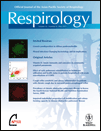Impaired endothelial progenitor cell mobilization and colony-forming capacity in chronic obstructive pulmonary disease
ABSTRACT
Background and objective: Recent studies suggest that there is endothelial impairment in both the systemic and pulmonary circulations of patients with COPD. Endothelial progenitor cells (EPC) are mobilized into the circulation by physiological stressors such as surgery, and are thought to play a role in the repair of damaged endothelium. There has been a steady increase in the frequency of surgery among COPD patients, due to the incidence of complications and lung cancer; however, the mobilization of EPC during lung resection has not been examined. We evaluated whether the mobilization and proliferation of EPC are impaired in COPD patients.
Methods: The numbers of circulating EPC (CD34/KDR/AC133-positive mononuclear cells) were measured by flow cytometry, in COPD patients (n = 30) and non-COPD patients (n = 30) who were undergoing thoracic surgery. EPC colony-forming units (EPC-CFU) were also examined.
Results: In non-COPD patients, both circulating EPC and EPC-CFU were significantly increased 2 h after the operation started, whereas in COPD patients there were no changes in circulating EPC or EPC-CFU, irrespective of the severity of COPD. Multiple linear regression analysis demonstrated that the presence of COPD was the only significant independent predictor of reduced mobilization of EPC during thoracic surgery.
Conclusions: The number of circulating EPC and EPC-CFU was not increased during thoracic surgery in COPD patients. These results indicate that both the mobilization and proliferative capacity of EPC are severely impaired in COPD patients.




